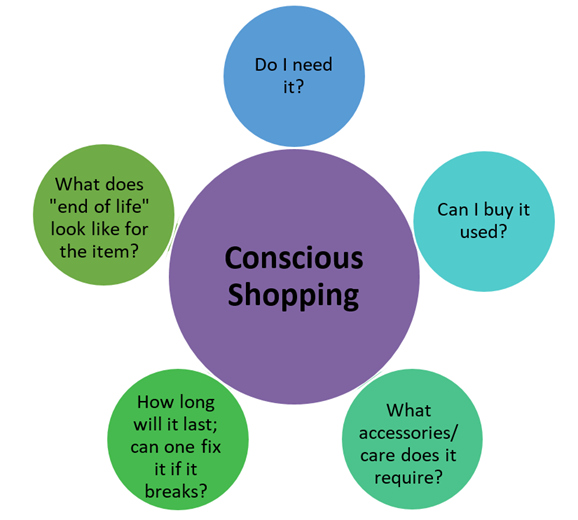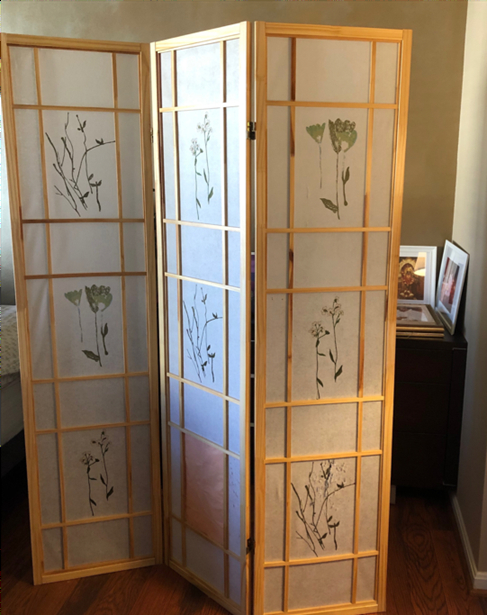
Home > Newsletters > GreenFriends Newsletters
| Home | Source Reduction | Friends of Green Friends | Newsletters |
| Gardening | Resources | What You Can Do | Embracing The Trees |
| Conscious Shopping by AYUDH Diksha |
 |
|
During Amma’s summer tour a few years ago, Swami Shantamritananda Puri reminded us that we are living in a "throw-away" society here in North America. Many products here are one-time use and/or may be inexpensive, yet only short-lived before they break.
One way to benefit Mother Nature and our beloved Amma, is to try to end any dependence we have on throw-away or limited use products, as far as we are able. These products are sometimes recycled, it is true, but the U.S. recycling system is in a bit of a crisis. As such, it is best to reduce purchases, or consider the life cycle of the items we buy, and think about how they will contribute to the well-being of Mother Nature, in the long term, before buying them. Below are a few points to consider when buying items, to help us shop consciously.
1. an item that requires storage space and 2. one more thing in the house that could potentially break and needs to be thrown away! Another creative solution could be to use a tension rod and a bedsheet to create a curtain or backdrop behind me for meetings - or simply to move to another room that doesn’t necessitate buying a room divider. We can try to think of many such solutions to our purchasing needs and try to improvise whenever possible. Amma says that we humans have lost the ability to discriminate between necessities and luxuries - that the real air conditioning we should turn on is the AC of the mind, allowing us to adapt to multiple situations peacefully. I do not feel I am very far along this path, but I do think that Amma’s lesson to adapt applies when we are looking to buy something new. Can we adapt with what we already have? If yes, then we can save ourselves the cost and worry that comes with owning one more item, benefit Mother Nature with one less thing to possibly throw away, benefit society by donating some of our money, and build our capacity to adapt to situations cheerfully. |
If you would prefer to buy local and lower any carbon footprint from shipping, consider looking for the item you would like on local, used item sales websites, or at local stores, if it is possible to shop at them safely and with COVID-19 precautions in place, such as masks. Ideally, we should buy "Used" whenever we can, to help save something that’s perfectly usable. |
Another consideration in deciding to buy something is thinking about what it takes to maintain it. For instance: does the item run on electrical power, or does it use batteries or gas? Electronics that run on batteries invariably generate battery waste which we may or may not be able to recycle depending on where we live and what programs are offered.
A good quality plug-in electronic likely produces less waste than a battery-powered electronic. Consider minor adaptations to items as well. For example, we have a wreath at home that we can light up using batteries. We’ve opted not to use any batteries at all and leave it unlit, saving on battery waste. Finally, think about whether you have the mental energy to clean the items you buy - will I be able to maintain it, or will I simply throw it away when it gets dirty? Hopefully the former, but it’s wise to think about whether we can care for an item before we add it to our collection.
|
For instance, that might mean trying to only buy natural fabrics or home items. Clothes that are cotton or linen or baskets and furniture made of untreated wicker or wood are compostable. If possible, only buy items that are compostable or recyclable. If not possible, let’s try to buy used, adapt with what we have, or try to buy a product that will last a very long time. Also, if we decide to stop using an item before it’s all used up or broken, we can sell it as a used item online, give it away for free, or donate it, rather than throwing it away. |
 Room divider |
|
Case Study Above is a room divider that I ended up sourcing from Craigslist, as I did not have a serene, empty space to teach yoga classes virtually. The room divider indeed has a hole and some tears in it. I patched the missing pane up with some packing tissue, and nobody on camera will ever see the defects. I feel I have saved this divider from the landfill and it will likely last many, many years to come with a little tender, loving care! At the same time, the divider has helped create an affordable, conducive environment to teach yoga classes to young children, who might otherwise be distracted by my surroundings. May Amma bless us all in our efforts to spread joy and live gently, with regard for our fellow beings and Nature, taking one step at a time to greater harmony in society and the world! Diksha, Maryland, USA |
Read The Pigeon Chronicles from the Winter 2020 newsletter >>
| Home | Source Reduction | Friends of Green Friends | Newsletters | Resources | What You Can Do | Contact Us |
For more information, e-mail info@greenfriendsna.org |
||||||